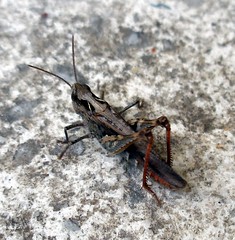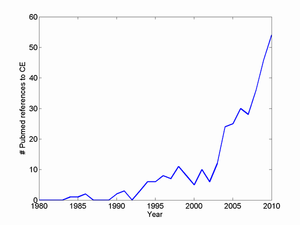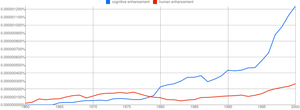June 28, 2011
Trends in cognitive enhancement interest
PubMed articles with "cognitive enhancement" in any field:
Looking into the Google ngram viewer I got this curve (cognitive enhancement blue, human enhancement in red):
The increase looks loosely exponential. The interest has been ongoing for a long time, maybe leading to current research which is then driving possible future applications. Still, the number of papers are fairly few per year - it is still a niche field. We might have a situation with more concern and debate than actual hard facts and developments. My prediction is that as we progress the term "cognitive enhancement "will start to disappear, and people become much more positive when they have concrete options.
June 22, 2011
Meeting an alien
 The boundary of a boundary is zero.
The boundary of a boundary is zero.
- For all of us.
Any map can be coloured with at most four colours.
- So you live down there.
What about you?
- I am equinumerous to many of my subsets.
That high, eh?
- Name a number, and I have a subset for it.
June 19, 2011
Panopticon Problems: Purists rather than Privacy?
 Would a transparent society where we could all watch each other be a better society?
Would a transparent society where we could all watch each other be a better society?
The standard argument is that transparency makes people behave well because they can be held accountable: either when they are doing something bad, or when others look back and find out what they did. So there is an incentive for doing things right.
People try to safeguard their reputations, and often behave more generously and cooperatively when observed by others. People also behave themselves when feeling watched, presumably because the internal machinery for reputation management has a long evolutionary background - we benefited from it long before we could think about social game theory, so it presumably runs on prerational hardware somewhere in our brains. This is why merely showing images of eyes is (sometimes) enough to affect behaviour. We rationally know they are not actually seeing us, but they affect the old systems anyway.
This might be an argument for having plenty of visible CCTV cameras - they induce pro-social behaviour both by discouraging criminals by increasing the chance they will be held accountable and by making the law-abiding citizens behave slightly better!
We are likely well on the way towards a transparent society where everything and everybody are going to be potentially observable. Sensors are becoming cheaper, smaller and embedded in ubiquitous devices like cellphones and computers, storing and networking the information is becoming cheap and often the default condition, technologies for mining such information are advancing rapidly and a whole bunch of identity technologies (RFID, object recognition, person recognition, biometrics, you name it) are maturing. As David Brin pointed out, a key issue is whether it is two-way transparency or one-way transparency; however, as Wikileaks demonstrated, it might be hard to effectively maintain secrecy for any group.
The real problem with a transparent society might not be privacy but tolerance. Privacy norms appear to be fairly flexible social constructions, and could presumably adapt to a world where anybody can in principle see anybody else and what they did.
However, a new paper suggest that feeling watched also influences our moral behaviour: People more strongly condemn bad behaviour when cued that they are being watched (paper: Pierrick Bourrat, Nicolas Baumard and Ryan McKay, Surveillance cues enhance moral condemnation, Evolutionary Psychology, 9:2 193-199 2011). They demonstrated that surveillance cues made students regard bad acts as less morally acceptable.
This is unsurprising, but bodes badly for the tolerance of a transparent society. People would not only be able to observe more transgressions against their norms, but would publicly view them as worse. They might of course exaggerate the denouncement - talk is cheap, after all - and it might not necessarily carry over into action or policy. But as the authors note:
Indeed, failure to express our support for prevailing moral norms may arouse suspicion in our conspecifics. Talk, however, is cheap, so we are wise to take such declarations with the proverbial grain of salt, discounting them as appropriate. In consequence, individuals may attempt to compensate for this discounting by ramping up their rhetoric. To the extent that these compensatory efforts are discounted in turn, they may be ultimately futile; what sustains them is the fact that failure to send the inflated signal immediately brands the deviant as morally suspect.
If this holds (and it seems likely), then the introduction of vastly greater surveillance powers would produce a lot more moral condemnation and competition in the condemnation. This is of course strengthened by the increased transparency: condemnation becomes more visible. There is also heightened penalties for hypocrisy: now you can even check if your neighbour actually does as he preaches. And he will of course check you.
In many cases this might be entirely desirable. It might help us behave better. But it is unlikely to make us saints: there is going to be enough transgressions for anybody to condemn us. Maybe this leads to a social equilibrium where people would abstain from excessive moral rock-throwing because they know they may become targets themselves. But not all people have the same social capital or support: socially marginal people like minorities or stigmatized groups would be far more vulnerable - and likely - as targets. Purists well anchored inside big communities would be able to gain status and support by directing opprobrium against outsiders, getting many people to join in because they both show their affiliation and reduce the risk of being targeted. A transparent society could be a fairly stable intolerant society.
There is a risk that the transition from current, humanely opaque and local, societies into very transparent and global societies might occur far faster than most people expect. We might not desire giving loud busybodies too much say over our lives (especially since they tend to have the most simplistic moral views), but avoiding it might be a tough moral, social and psychological problem.
Figuring out how to live in a more transparent and more globalized world (where numerous communities with wildly different mores are transparent to each other) is one of the key challenges right now, in the early days of the information revolution.
(slightly modified version posted on Practical Ethics)
June 09, 2011
Kafka would have approved
 Continuing the theme of food that might scare some: San Francisco health officials won't let Mission District restaurant owner sell grasshopper tacos | abc7news.com. The problem isn't that the restaurant is selling grasshopper tacos, but that they are not imported from an FDA approved source. However, there are no FDA approved sources of grasshoppers.
Continuing the theme of food that might scare some: San Francisco health officials won't let Mission District restaurant owner sell grasshopper tacos | abc7news.com. The problem isn't that the restaurant is selling grasshopper tacos, but that they are not imported from an FDA approved source. However, there are no FDA approved sources of grasshoppers.
I tried these tacos when I was there, and they were quite good. Crunchy and with a good taste. Even better, some of my lunch partners didn't finish theirs, so I got theirs too :-) I hope the restaurant can solve the problem, for example by farming the locusts in the US.
Incidentally, the CDC food-borne disease outbreaks database does not contain any reference to any outbreaks due to grasshoppers as far as I can see (there was one outbreak where tarantulas gave 15 people problems - so arthropods are not perfectly safe). I suspect the reaction is more a typical disgust/purity reaction to eating something normally taboo in western culture (this is strengthened by the other story where the Columbia County department of public health advised against using cicadas as food ingredients because the agency's food code doesn't address them).
From an environmental perspective (paper) insects are probably far better meat than most vertebrate meat. But I guess the problem is the small body size; however, using oxygen enriched air insects could grow larger. But maybe that is a bit too much like factory farming? In the long run the proper approach is in vitro meat anyway.
June 06, 2011
Frightening food
 Food scares are in the air (in the pot?) right now, but what should we be rationally worried about in terms of outbreaks of food-borne diseases?
Food scares are in the air (in the pot?) right now, but what should we be rationally worried about in terms of outbreaks of food-borne diseases?
CDC has a Foodborne Outbreak Online Database that contains cases from the last two decades. These are cases serious enough that somebody reported them to the CDC. They cover everything from bad sausages to salt and muktuk (fermented beaver tail). Writing a parser for the data in Matlab, I got the following results:
Most number of people affected by the food (i.e. what is most likely to get you if you eat an average diet):
| Affected | # outbreaks | Mean size | Food |
| 56769 | 1952 | 29.082480 | - |
| 2760 | 55 | 50.181818 | multiple foods |
| 2285 | 17 | 134.411765 | tomato, unspecified |
| 1747 | 3 | 582.333333 | other milk, pasteurized |
| 1536 | 17 | 90.352941 | salsa, unspecified |
| 1535 | 1 | 1535.000000 | peppers, jalapeno; tomato, unspecified; peppers, serrano |
| 1397 | 6 | 232.833333 | watermelon |
| 1332 | 28 | 47.571429 | potato salad |
| 1273 | 32 | 39.781250 | pork, BBQ |
| 1016 | 19 | 53.473684 | cake, unspecified |
Many outbreaks are never traced, or due to multiple foods. But otherwise it is clear that it is the veggies that are risky, besides the somewhat obvious milk and BBQ pork. Badly washed vegetables or spicy salsas that hide off tastes are clearly worth watching out for. And while the cake might not be a lie, it can be slightly risky.
What foods cause the most alarms? These would be the foods that are easy to get illness from, but the outbreaks are small:
| Affected | # outbreaks | Mean size | Food |
| 56769 | 1952 | 29.082480 | - |
| 210 | 56 | 3.750000 | fish, mahi mahi |
| 2760 | 55 | 50.181818 | multiple foods |
| 210 | 49 | 4.285714 | fish, ahi |
| 940 | 41 | 22.926829 | oysters, raw |
| 934 | 40 | 23.350000 | lettuce-based salads unspecified |
| 219 | 39 | 5.615385 | tuna, unspecified |
| 320 | 36 | 8.888889 | ground beef, hamburger |
| 936 | 35 | 26.742857 | ground beef, unspecified |
| 548 | 33 | 16.606061 | chicken, unspecified |
Now seafood and meats jump up, although those salads still cause trouble. The reason for the mahi-mahi is likely ciguatera - those dinoflagellates can produce some pretty impressive poisons.
What foods produce the biggest outbreaks?
| Affected | # outbreaks | Mean size | Food |
| 1535 | 1 | 1535.000000 | peppers, jalapeno; tomato, unspecified; peppers, serrano |
| 950 | 1 | 950.000000 | gravy, beef; roast beef, unspecified; potato, mashed |
| 716 | 1 | 716.000000 | Peanut Butter; Peanut Paste |
| 715 | 1 | 715.000000 | peanut butter |
| 1747 | 3 | 582.333333 | other milk, pasteurized |
| 552 | 1 | 552.000000 | tuna salad; salad bar |
| 517 | 1 | 517.000000 | chicken, baked; green pea salad |
| 927 | 2 | 463.500000 | corn, unspecified |
| 333 | 1 | 333.000000 | pasta salad; potato salad; vegetable-based salads unspecified |
| 300 | 1 | 300.000000 | picadilla |
...
The problem here is that many of these are single outbreaks - that pepper outbreak affected 1535 people. So to be on the safe side, lets look at the biggest average size of outbreaks where there has been more than 2:
| Affected | # outbreaks | Mean size | Food |
| 1747 | 3 | 582.333333 | other milk, pasteurized |
| 830 | 3 | 276.666667 | hummus |
| 999 | 4 | 249.750000 | macaroni salad; potato salad |
| 1397 | 6 | 232.833333 | watermelon |
| 650 | 3 | 216.666667 | roma tomato |
| 993 | 5 | 198.600000 | green onion/scallion |
| 675 | 4 | 168.750000 | basil, unspecified |
| 653 | 4 | 163.250000 | orange juice, unpasteurized |
| 413 | 3 | 137.666667 | pot pie |
| 2285 | 17 | 134.411765 | tomato, unspecified |
The vegetables strike again. This is also where biosecurity has to work hardest: presumably these are the easiest ways of distributing food-borne pathogens. The dairy industry is recognized, but how much protection does our watermelons have? (the problem with watermelons and several of the others is likely that they have an often unwashed surface that people touch with while eating, and then they get the pathogens in their mouths)
In total, 161284 people were affected in 5153 outbreaks. 181 died, 7803 were hospitalized.
And people worry about genetically modified food! They should worry far more about ordinary dirt and the natural, very organic pathogens that live there.
(Some caveats: the same foodstuff might occur in several food descriptions, making exact analysis a bit tougher than what I want to do a Monday evening. I make no claims to know what I am doing. Here is the processed file, sorted by affected people: Download file )
June 05, 2011
Xenology
 It is fun to discover an old book that remains relevant.
It is fun to discover an old book that remains relevant.
Today's find is Xenology: An Introduction to the Scientific Study of Extraterrestrial Life, Intelligence, and Civilization by Robert A. Freitas Jr (1979). Fulltext online.
It is fun to see the early Freitas (a fellow reference-maniac) take a look at extraterrestrial life, planetology as it was back then, xenobiology, alien intelligence, megascale engineering (and beyond!), interstellar economics, how to deal with civilizations many orders of magnitude more advanced than us, thermoethics and much, much else. Some parts have not aged well (science, even social science, marches on), others remain fresh and worth checking by current investigators.
Especially fun (and good instructions for UFO abductees) is Appendix A. What To Do If You Encounter Alien Beings or Their Craft (Surprise Contact Scenario)

